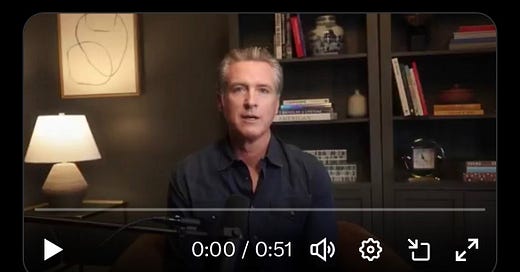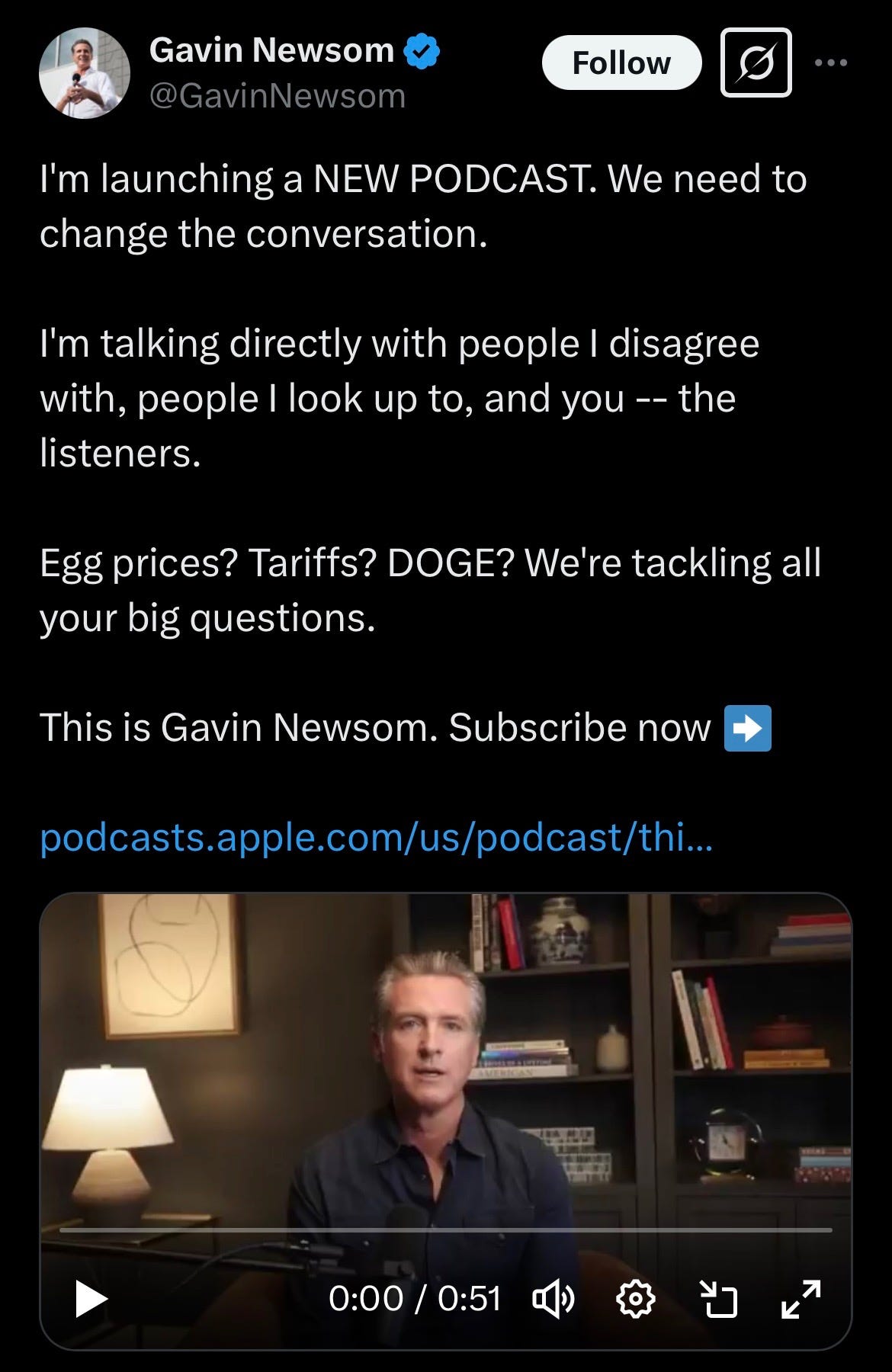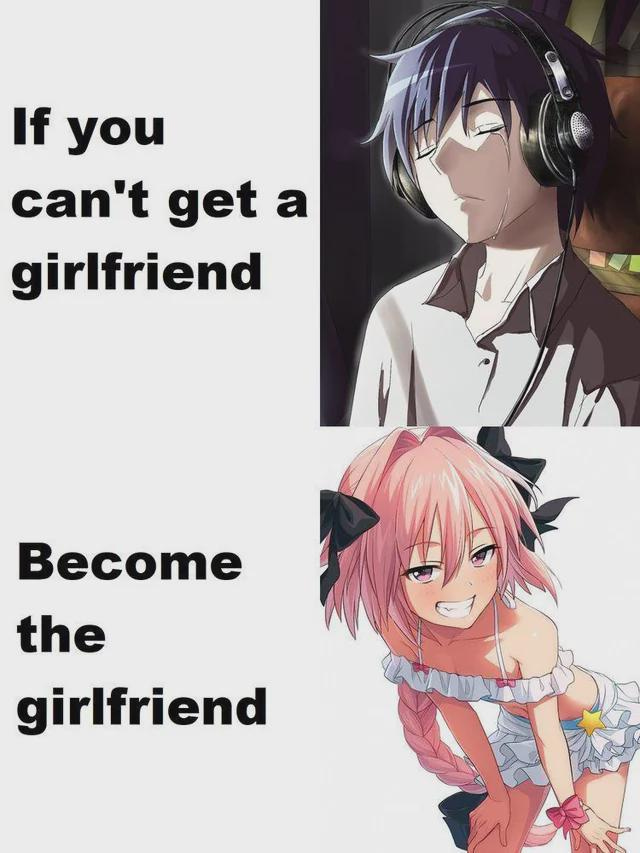POV: you fell down an internet rabbit hole and became obsessed with fringe ideologies. Through the steady consumption of Wojaks, you came to understand how MAGA-communism and libertarian sov-corps would converge to produce a neo-Hapsburg empire of feudal micro-nations under a state capitalist framework. Your normal friend blinks a few times and reminds you that there are girls at the party:
In my essays about the internet and politics, I’ve sought to advance a few core ideas. Among these writings have been a handful of predictions that usually happen in the worst way possible. This is certainly the case with Gavin Newsom, the governor of California, who recently launched his own podcast:
As the smoking embers of Los Angeles had barely cooled, Newsom took to socials to promote his new media venture. This is Gavin Newsom is a conventional hour+ podcast format that features discussions with guests from across the political spectrum. The first episode, with conservative influencer Charlie Kirk, launched last week and currently has just over 625k views on YouTube. (You’ve probably seen some clips going around this week.) On the podcast, Newsom and Kirk discuss the growing influence of alternative media. Newsom appears approachable, transparent and candid which is remarkably different than his actual insider, exclusionary and nepotistic rise to political office.
For the past few years, I’ve argued that the vast influence of online content creators will slowly spill over into real world politics. We’ve seen this begin to take shape with legislative testimony, fundraising, canvassing and riots. Broadcasters have always influenced their audience’s decisions about how to vote — but today they do much more.
A few weeks back, we revisited this piece from The Guardian in 2021:
In the essay, I outline the numerous electoral runs by influencers and content creators from across the political spectrum. But as online personalities become more like politicians, this also leaves open the possibility for its inverse; politicians may soon become influencers themselves. In the era of social media, we are watching a convergence of these two previously distinct fields.
Importantly, Democrats have been unable to harness the power of populist media. Programs like Joe Rogan, Theo Von and others, helped to cultivate support for Donald Trump in 2024. These podcasters were personally thanked on stage by the Trump campaign during their acceptance speech.
In the minds of loyal Democrats, Kamala Harris lost not because of her message but because she didn’t have a strong enough alt-media game. They want a “liberal Joe Rogan”. But after eight years of election cycles that have been painfully litigated over social media, we still do not have one Rogan-style interview of a prominent Democratic candidate. Here’s why:
An unscripted, long form discussion would be disastrous for a Democrat. Populist audiences want to hear clear and universal statements like: “Medicare for All”. Instead the Democrats give us: “a student loan debt forgiveness program for Pell Grant recipients who start a business that operates for three years in disadvantaged communities”. There is no mass public that actually wants this strange fetish for overly complex process and procedure. As the Democratic party has shifted to represent the interests of urban professionals, the working class has abandoned them in historic numbers.
Additionally, there is no satisfying answer for why blue states have failed to govern effectively. (Kamala Harris chose not to appear on Joe Rogan and opted instead for 12 minute scripted interviews on mainstream cable news.) When asked why blue state residents pay European levels of taxes but get so little in return, Democrats can only remind us that Trump is doing a fascism. In a Rogan-style interview, Newsom would not be able to give a satisfying answer for why California, one of the largest economies in the world, has the worst housing crisis in the nation. These are the kind of simple questions that need to be avoided at all costs.
Joe Rogan: “That’s crazy man. Why did California run out of water?”
Gavin Newsom: *spaghetti falls out of pockets*
Rather than adjusting their dysfunctional and unpopular policies, Democrats have chosen to broadcast their ideas more loudly than ever. If you can’t get the guest spot, become the podcaster. Their strategy for 2028 is to build their own liberal alt-media pipeline in a hope to side step populist media altogether. They are basically doing this meme for podcasts:
Zooming out, the convergence of alt-media and real world politics makes more sense than what may first appear. Adolph Reed, professor emeritus of political science at the UPenn and hopefully soon a guest on Doomscroll, once said that ‘political organizations are just a list of names and contact information’. Under the current design of our communication networks, cultural commentary such as sports, video games or comedy, is structurally indistinguishable from channels that focus on social issues or even those that belong to official political organizations. (The DSA ✅ is just another channel on Twitch or Instagram.)
In this new paradigm, the only metric that truly matters is conversion rates: what channel can place a call to action that mobilizes that largest portion of their audience? The specific topic or genre of a channel has become less important than the degree of trust that the creator has with their audience. High conversion rates can help to turn out members for canvassing and other political actions. Consider this example:
Some years ago, I had a conversation with a VC who had invested in several start ups that were building social media platforms. One of these companies proposed a new social network that would help people find personal financial advisors (think ZocDoc for your portfolio). When the platform launched, it was sparsely gatekept. It required few credentials and allowed the market to decide who or what to listen to. Within a year, the overwhelming majority of monthly active users on the platform were astrologers selling personal chart readings. While the platform intended to connect individual consumers with personalized investment advice, it’s design led to something else entirely.
This same tension between a platform’s stated intent and its teleology of design is present in all of our social media networks today. We may have invented FaceBook to connect college students, but its underlying digital infrastructure allowed for new forms of voluntary association along all axes of cultural and political affiliation. For better or worse, this also means that types of organizations, which were not part of the initial design intent, are not only possible but are actively taking shape over social media.
From Donald Trump to AOC, we can fairly say that all politicians, in the age of digital media, have become a soft form of influencer. It is stupid but also necessary to state that the slow and deliberate work of governance should not abide by the volatile incentives of the attention economy. I want my representatives arguing for industrial policy and advanced market commitments to American manufacturing, instead of reproducing the topics that already float to the top of social media. But the influence of long form durational podcasts rises to another category beyond just “being good at posting”.
Newsome undoubtedly plans make a presidential run within the next few years. With This is Gavin Newsom he hopes to disintermediate populist political commentators like Joe Rogan and Theo Von. In 2028, Newsom will attempt to use his own reach and directly ask listeners to vote for him. But I have a hard time imagining that anyone in the smoking rubble of Altadena is listening and thinking to themselves, “damn Gavin Newsom is low key based on getting trans kids out of sports” as they prepare to sleep in their car.
Politics is the struggle over scarce resources. In a democratic society (for the time being anyway), this involves persuading others to join your side. Media is a necessary component of political discourse. If this convergence of politicians and influencers is truly inevitable, like newspapers and cable television before it, we should consider the best ways in which to engage. In the case of populist politicians, this strategy could perform quite well and could substantially build trust. However, it won’t work that way for the establishment Democrats.
Over the next few years, Newsom will most likely experience mainstream success. But similar to other Democrat-affiliated programs, it will fail in the field of electoral politics. Positive feedback from a loyal audience will allow Democrat consultants to delude themselves of its real influence. High view numbers will grant them permission to avoid addressing the bread and butter issues that actually work to move votes.
Be ready for glowing adulation from the Democrat-affiliated media. And be ready for historic margins of working class voters continuing to drift to the right.







Liberals: We will offer you nothing
Conservatives: We will offer you nothing but we hate trans people & you can say the word retarded
2026 midterms and 2028 election looking bleak
Hasan better pack it up now; the Rogan of the Center-Left™ has arrived! I think you're spot on here about what this project will likely achieve, i.e., just another echo chamber for Democrats to continue to delude themselves while drifting farther away from working class issues.
I would absolutely love to see Adolph Reed Jr. (or Touré Reed) on an episode of Doomscroll. I think a discussion about his experience with the failure of creating an American Labor Party could dovetail nicely with Briahna Joy Gray's ideas about building the Green Party. Anyway, love the work you're doing!